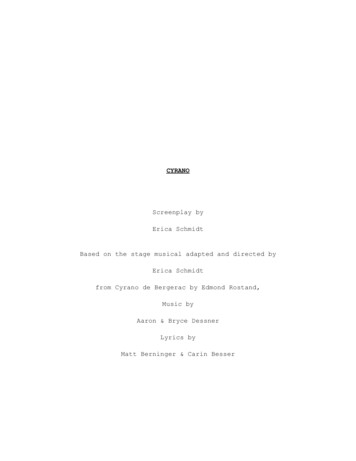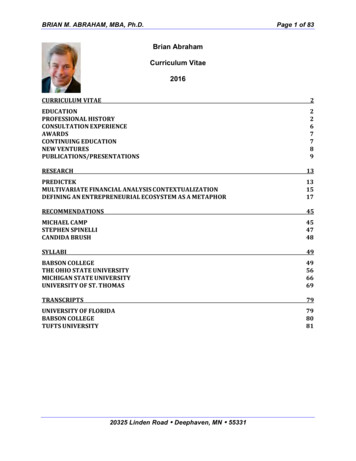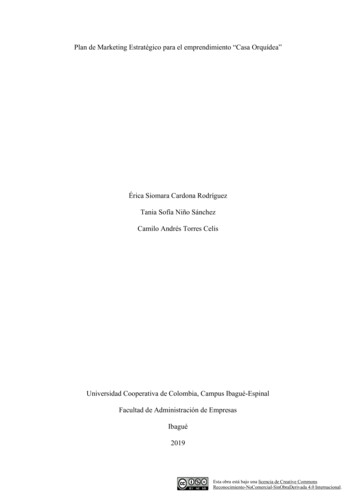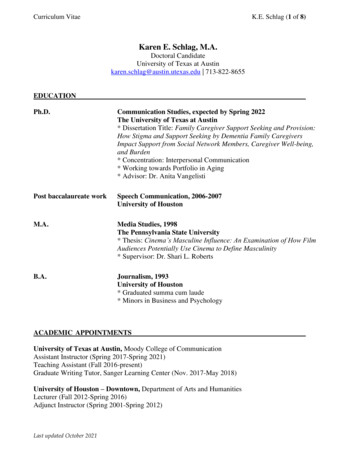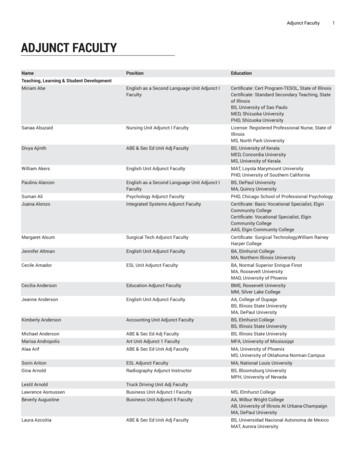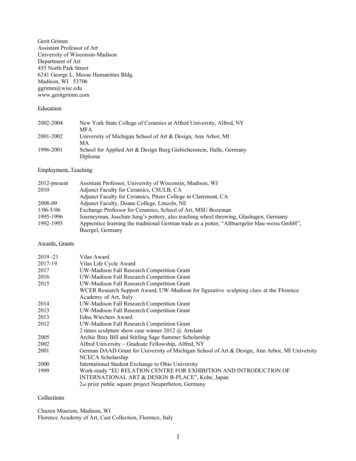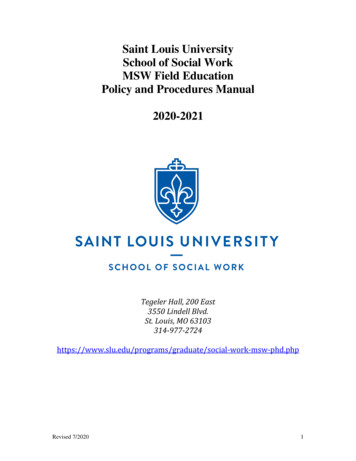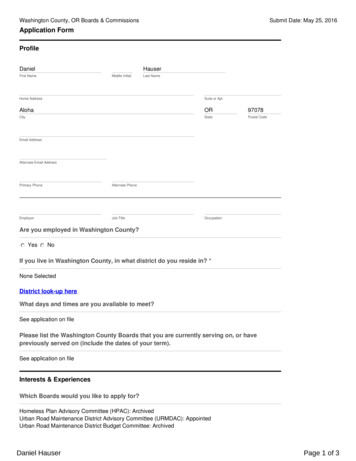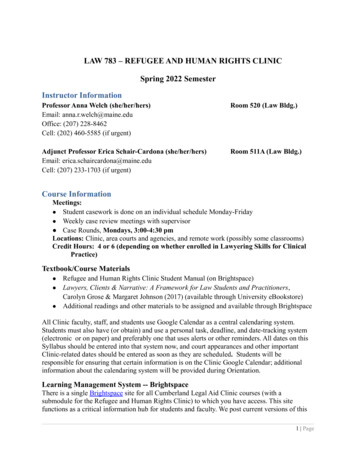
Transcription
LAW 783 – REFUGEE AND HUMAN RIGHTS CLINICSpring 2022 SemesterInstructor InformationProfessor Anna Welch (she/her/hers)Email: anna.r.welch@maine.eduOffice: (207) 228-8462Cell: (202) 460-5585 (if urgent)Room 520 (Law Bldg.)Adjunct Professor Erica Schair-Cardona (she/her/hers)Email: erica.schaircardona@maine.eduCell: (207) 233-1703 (if urgent)Room 511A (Law Bldg.)Course InformationMeetings: Student casework is done on an individual schedule Monday-Friday Weekly case review meetings with supervisor Case Rounds, Mondays, 3:00-4:30 pmLocations: Clinic, area courts and agencies, and remote work (possibly some classrooms)Credit Hours: 4 or 6 (depending on whether enrolled in Lawyering Skills for ClinicalPractice)Textbook/Course MaterialsRefugee and Human Rights Clinic Student Manual (on Brightspace)Lawyers, Clients & Narrative: A Framework for Law Students and Practitioners,Carolyn Grose & Margaret Johnson (2017) (available through University eBookstore) Additional readings and other materials to be assigned and available through Brightspace All Clinic faculty, staff, and students use Google Calendar as a central calendaring system.Students must also have (or obtain) and use a personal task, deadline, and date-tracking system(electronic or on paper) and preferably one that uses alerts or other reminders. All dates on thisSyllabus should be entered into that system now, and court appearances and other importantClinic-related dates should be entered as soon as they are scheduled. Students will beresponsible for ensuring that certain information is on the Clinic Google Calendar; additionalinformation about the calendaring system will be provided during Orientation.Learning Management System -- BrightspaceThere is a single Brightspace site for all Cumberland Legal Aid Clinic courses (with asubmodule for the Refugee and Human Rights Clinic) to which you have access. This sitefunctions as a critical information hub for students and faculty. We post current versions of this1 Page
syllabus, assignments, announcements, links, useful resources, and other important information.It is your responsibility to check the site frequently for new postings. You can access Brightspacethrough the MyLaw Portal.Course DescriptionThe Refugee and Human Rights Clinic (“RHRC” or “the Clinic”), a program within theCumberland Legal Aid Clinic, provides a challenging opportunity for students to advocate onbehalf of low-income immigrants in a broad range of cases and projects. Clients include, forexample, asylum applicants who have fled human rights abuses in their home countries and areseeking refuge in the United States, immigrant survivors of domestic violence, immigrantvictims of certain crimes, and abandoned, neglected or abused children seeking legal status in theUnited States. Project work includes impact litigation before the federal courts,Know-Your-Rights (KYR) and educational outreach to Maine’s immigrant populations, outreachto immigrants being held in some of our nation’s immigrant detention centers (Laredo andStrafford), among a range of other projects. Under faculty supervision, student attorneys notonly develop their substantive knowledge of immigration law and human rights laws and normsbut also build core legal skills relevant to the general practice of law.Please note that the work you will do in the Refugee and Human Rights Clinic may involvetopics of a sensitive and troubling nature, including, but not limited to, murder, assault, domesticviolence, rape and other forms of sexual assault, crimes against children, detention, torture, andracism, homophobia, misogyny, and other forms of prejudice. If you have concerns that any ofthis work, including our discussions around this work, could be particularly disturbing for you,including triggering signs or symptoms of PTSD, such as flashbacks or reliving past trauma,please feel free to speak to a faculty supervisor privately. And, if you feel triggered or otherforms of distress during one of our class discussions, you may leave the room withoutexplanation and excuse yourself from a conversation. Keep in mind that during confidentialdiscussions with a faculty supervisor, you need not divulge any personal experiences, opinions orother reasons for why you might wish to discuss alternative assignments and/or whether youwish to refrain from certain class discussions.While Clinic faculty in the Refugee and Human Rights Clinic provide instruction andsupervision, the students are, in every respect, the lawyers for the Clinic’s clients. Students’clinical work includes, e.g., interviewing clients and preparing their testimony, conductingfactual and legal investigation and marshaling of evidence, analyzing and presenting humanrights documentation, preparing factual affidavits and testimony, preparing expert witnessaffidavits and testimony, writing legal briefs, and appearing in administrative hearings.Another significant component of the Refugee and Human Rights Clinic is Case Rounds,student-led classes modeled after “rounds” in the medical setting. In each rounds, one or morestudents will present a particular case or project (generally one in which a challenge of somekind has arisen) to the group, and all students discuss the issue and help the student develop aplan. Rounds are scheduled for Mondays at 3:00-4:30 p.m. in Room 506, unless a LawyeringSkills for Clinical Practice class is taking place at that time.1 All students are expected to be1See Clinic Spring 2022 Schedule of Classes, Assignments, and Topics for All Clinic Courses.2 Page
prepared and engaged participants in each case rounds. Attendance at all case rounds is requiredunless you receive prior approval of a faculty supervisor.Each student who has completed Evidence, Trial Practice, and Professional Responsibility isrequired to participate in the Protection from Abuse Project, in which Clinic student attorneysrepresent victims of domestic violence, stalking, and sexual assault in protection from abusecases in Lewiston District Court (generally on Fridays), on at least two occasions during thecourse of the semester.Clinic requires a significant time commitment from the student attorneys. Each student mustmaintain a regular schedule of office hours in two 2-hour blocks each week and attend weeklyseminars and case rounds, in addition to the client meetings and court dates that are a part ofclinic practice. Students will also have regularly scheduled (and unscheduled) case and projectreview meetings with faculty supervisors. Students must record all time spent on Clinic-relatedwork, other than time spent in case rounds (because that time is already counted). Each student isexpected to spend, on average, approximately 15 hours per week (for those taking it for fourcredits) and approximately 20 hours (for those taking it for six credits) doing Clinic-related workpursuant to the Law School’s policy on Determination of Credit Hours for Coursework. Caseand project- related work should be completed during regular business hours while in the Clinicbuilding, at court, working remotely from home, or other locations related to a case or project.Clinic is a combination of classroom learning and real world work with clients who have realproblems. What you do as a student lawyer has serious and permanent consequences for thoseclients. There is much hard work to be done on every case, and it needs to be done on the termsand schedule of the court or other tribunal. While the effort and time you spend on your clinicwork is, of course, very important, the quality of the work, as measured by what the court oradministrative agency requires of you to ensure that your client has the best chance of winning,is critical.What this means is that just showing up for Clinic and doing the various tasks associated withyour cases, while necessary, is not sufficient. You will need to do the work competently and withthe same degree of care, attention, and skill that you would want your lawyer to do on a caseinvolving your life. Your clients deserve nothing less. We emphasize this important point now,before you have started the semester, because we do not want any student to take Clinic thinkingthat, because there is no final exam or major paper, all one has to do is show up, put in the time,and do some work. That is not how the practice of law works, and it is not how the Clinic works.Good lawyers are not just advocates for their clients’ positions; they provide that advocacyeffectively, professionally, and properly in the appropriate tribunal. This is what we expect you todo, and your grade in Clinic will reflect the extent to which you are a good lawyer.The Clinic faculty will spend the time and energy needed to teach you how to be a good lawyer.You (the student) will need to spend the time and energy every day, every week, all semester todo quality work and therefore to be a good lawyer. The faculty cannot, and will not, do that foryou.3 Page
Because our clients’ cases do not and cannot be paused during exams or law school breaks, youwill remain counsel of record and there responsible for your cases until the last day of thesemester, May 20, 2022. However, with advance planning and some help from your fellowstudent attorneys, this responsibility does not mean that you cannot set aside time to study forand take final exams nor does it mean that you cannot take time off from your Clinic workduring the semester and during law school breaks.Supervision Meetings and Feedback: All students are required to meet on a weekly basis withyour faculty supervisor. During the first week of classes, students will be assigned a weeklymeeting time. Because you are primarily responsible for the development, planning, andperformance of client and project work, you manage our supervision meetings. Before eachmeeting, students are expected to submit an agenda, as well as an updated “To-Do” list. Theagendas and “To-Do” lists are due at least 24 hours before the meeting. See the RHRC StudentManual for more information and samples.In order to provide you with high-quality feedback, we generally require 48 hours (duringbusiness days, not weekends) to review your more substantial work product (client affidavits,legal memos, etc.). That means that if you provide us with a draft of your work product by 12p.m. on Monday, we will review it by 12 p.m. on Wednesday. If you need something reviewedfaster, please let us know. Note, however, that less substantial work product (draft emails, letters,etc.) will be reviewed in a shorter time frame.Students will also meet individually with us at the beginning of the semester (at which point youwill set your learning goals), and again at the mid semester point, both to engage you in areflective dialogue about what you have learned during the semester and to reflect on yourexperiences to date.Be sure to calendar all of the dates and deadlines on this Syllabus and the Schedule ofClasses, Topics, and Assignments now. Note in particular that there are additional classesduring the first several weeks of the semester, as well as a significant amount of written materialto review, including before the semester begins. This schedule is essential to ensure that, as youstart to work with clients, you are fully oriented to Clinic procedures and have some backgroundon the legal issues with which we deal most often.Course Goals & Learning Objectives2GOALSOBJECTIVESUpon successful completionof this course, students willknow/understand:Upon successful completionof this course, students willbe able to:ASSESSMENTSHow the student will beassessed on these learningobjectives:2Note that the Lawyering Skills for Clinical Practice course is specifically designed to complement your client andproject work in the Refugee and Human Rights Clinic, and your client work will enhance your learning in thatcourse. The goals and objectives described here pertain only to the Refugee and Human Rights Clinic.4 Page
The “Lawyering Skills andCompetencies” described inRefugee and Human RightsClinic Casework Rubric,including the following:Skills and competencies relatedto professional relationshipsand communicationHow to develop a meaningfuland effective attorney-clientrelationshipHow to develop and cultivate acultural humility framework asyou explore and learn from theperspectives of your clients,peers, and instructors in theclinicDevelop key professional andleadership skills that you willuse in your first few years as anattorney, including: planning forand running meetings; settingagendas; time management; filemaintenance; email and letteretiquette; receiving and givingfeedback; and deep listeningSkills and competencies relatedto case theorySkills and competencies relatedto fact investigationSkills and competencies relatedto written advocacySkills and competencies relatedto negotiationSkills and competencies relatedto client counselingSkills and competencies relatedto oral advocacySkills and competencies relatedto reflection and developing aprofessional identityPerform the skills andcompetencies described in theCasework Rubric well withminimal supervision and beready to work with clients,including in the followingspecific areas:Develop and manageprofessional relationships withclients and others“”(1) Ongoing feedback fromFaculty Supervisors on caseand project work;(2) Evaluation of the student’slevel of achievement in thespecific criteria described inthe Clinic Rubrics“”“”Be a compassionate andeffective advocate.“”Use a range of tools andpractices when lawyering thatwill ensure work is doneethically, efficiently,professionally, appropriately,and effectively.“”Develop and implement a casetheoryDevelop and implement a factinvestigation strategyEngage in effective writtenadvocacy on behalf of a clientEffectively negotiate a legalmatter on behalf of a clientEffectively counsel a clientabout critical decision in theircase through client-centeredpracticesEffectively advocate for a clientin court or administrativeproceedingsEngage in ongoing reflectivelawyering and use insights forcontinuous growth andimprovement as a lawyer; learnfrom 5 Page
Skills and competencies relatedto organizing and managingworkSkills and competencies relatedto managing ethical issuesEffectively organize, prioritize,and manage work“”Identify ethical issues andaddress them appropriately“”Course Requirements and Grading:We require the following of all Clinic students: Attending and preparing for all orientation sessions, court appearances, case rounds,supervision meetings (unless excused by faculty in advance) Professionally, responsibly, ethically, and competently managing case and project load(generally 2-5 cases), including maintaining regular contact with clients Meeting specific deadlines set by faculty supervisors for work on individual cases If applicable, participating in Protection from Abuse Project on at least two occasions persemester (additional participation may be required to ensure that we have adequatecoverage for all dockets) Accurately recording and reporting all time spent on Clinic-related work Completing assigned readings Completing writing assignments Completing a faculty-approved case summary for each case that will be transferred to anew student attorney next semester. First drafts are due on April 29 (additionalinformation on the deadlines and requirements for these will be provided during thesemester) Complying with all Clinic policies and procedures Collaborating with fellow cliniciansThe Refugee and Human Rights Clinic employs the Law School’s letter grading system; thePass-Fail option is not available. Students’ final grades will be based on all aspects of theirclinical work throughout the semester. The rubrics and explanation of our grading procedures areposted on Brightspace under the “Refugee and Human Rights Clinic” module.Please note that students who receive a grade lower than a “B–” for this course will not bepermitted to enroll in a subsequent Cumberland Legal Aid Clinic course, regardless of theirlottery placement.6 Page
COURSE POLICIESThe Refugee and Human Rights Clinic’s policies and procedures are set forth in detail in theRefugee and Human Rights Clinic Practice Manual. The specific reading assignments for theManual are noted in the Schedule of Classes, Topics, and Assignments for All Clinic Courses .Academic Integrity PolicyEach student should know the standards of conduct and expectations of academic integrity.Violations of academic integrity include any actions that attempt to promote or enhance theacademic standing of any student by dishonest means. Cheating on an examination, plagiarism,making statements known to be false or misleading, falsifying the results of one's research,improperly using library materials or computer files, or altering or forging academic records areexamples of violations of this policy. Acts that violate academic integrity disrupt the educationalprocess and are not acceptable.Evidence of a violation of the academic integrity policy will normally result in disciplinaryaction, including referral to the UMS Student Conduct Code process. A copy of the completeAcademic Integrity Policy is available on the University of Maine System website or the MyLawPortal.Please note that because Clinic students are working with actual clients, our responsibilityto the public may require a student’s immediate dismissal from the course if there is aninfraction.Inclement WeatherFor information on campus closings, please call the storm line at 207-780-4800 or sign up forUSM text alerts. If the University of Southern Maine closes the campus or cancels classes, thisalways applies to the Law School. In rare circumstances, the Law School closes before USM. Inthis situation, an email about closings will be sent to students through the email listserv.If the Law Building is (1) closed for the day, (2) open late and our class is scheduled to startbefore the law school opening, or (3) closed early and our class is scheduled to end after thebuilding closes, then classes may be held remotely. If this is the case, students will be notifiedand sent a ZOOM link. If you are unable to attend class due to the inclement weather, youshould notify a member of the Clinic faculty.If a class is canceled, we will let you know about scheduling a make-up.Please note that even if school is closed due to the weather, you may still need to appear incourt for a scheduled hearing or other appearance.Participation/AttendanceAll students must be on time for and attend all orientation sessions, court appearances, caserounds, and supervision meetings unless their attendance has been excused by a facultysupervisor in advance. Students are expected to be prepared for and fully engaged during all case7 Page
rounds and supervision meetings and to demonstrate the highest level of professionalism, ethics,competence, and diligence to all aspects of their work in Clinic.COVID-19-Related Attendance Policy: If you have any concerns about your own health or thatof your immediate family, please do not come into the Law School. A health-concern basedabsence will not count against your grade during the COVID-19 pandemic.Teaching MethodsAs we will describe in more detail during Orientation, we employ an extensive range of teachingmethods in Refugee and Human Rights Clinic, including both classroom and individualizedinstruction.Class RecordingAs a general rule, the recording of all classes is prohibited without permission. If you will beabsent from class and wish to record a missed class session, you must first contact me forpermission. If permission is granted, you must arrange for a classmate to facilitate the recording.(Suggested mobile apps for self-directed audio recording can be found in the MyLaw Portal.)All class recordings are for personal use only and may not be uploaded to the internet orotherwise shared, transmitted, or published without the prior consent of the professor. Ifpermission is denied, then you must find an alternative method for making up the missedmaterial.If you are requesting the recording of classes pursuant to the Americans with Disabilities Act orin the case of exceptional circumstances, such as severe illness or hospitalization, you shouldcontact the Dean of Students.If you are requesting the recording of classes for reasons related to COVID-19 isolation,quarantine, or family care, please contact me before the class to request the recording.Recordings will be provided by me for absences in these cases. If you anticipate missingmultiple sessions of a class for health, family care, quarantine, or other reasons, please contactthe Dean of Students.MAINE LAW POLICIES AND RESOURCESDisability AccommodationsThe Law School is committed to providing students with disabilities equal access to all programsand services. If you think you have a disability and would like to request accommodations,please contact the Disability Services Center (DSC). Timely notification is essential. TheDisability Services Center can be reached by calling 207-780-4706 or by emaildsc-usm@maine.edu. If you have already received an accommodation letter from the DisabilityServices Center and would like to discuss your accommodations for this course, please contactDean of Students Scheherazade Mason who serves as the liaison to the DSC. If you would like todiscuss your accommodations with us, you can email one of the Clinic faculty directly.8 Page
Health and Wellness Resources for Maine Law StudentsMaintaining your physical and mental health is essential to learning the law and succeeding inlaw school. Law school is a setting where mental health or substance use struggles can beexacerbated. If you ever find yourself struggling, do not hesitate to ask for help. Maine Law iscommitted to promoting wellness for all students. We encourage all of you to review the Health& Wellness Resources listed on the MyLaw Portal. The resources include confidentialcounseling through USM Counseling Services (207-780-4050) and the Maine AssistanceProgram for Lawyers and Law Students (207-266-5951). You can also contact the Maine LawOffice of Student Affairs. Please let us know if you have any questions.If you are facing illness, injury, the birth of a child, death in the family, or other extraordinarycircumstances that may impact your participation in this course, you should contact one of us inadvance of missing classes or any assignment deadlines. Stressful situations like these may leadto diminished academic performance or may reduce your ability to participate in daily classroomactivities. Law School services are available to assist students with handling these stressfulevents. In an emergency situation and in cases of unforeseen circumstances, you should contactDean of Students Scheherazade Mason as soon as possible. For examination conflicts oremergency situations during the examination period, please see the Registrar.Statement on Religious Observance for Maine Law StudentsMaine Law respects the religious beliefs of all members of the community, affirms their rights toobserve significant religious holy days, and will make reasonable accommodations, uponrequest, for such observances. If your religious observance is in conflict with the academicexperience, you should inform us of the class or other functions that will be affected. It is yourresponsibility to make the necessary arrangements and follow our agreed upon accommodation.Title IX StatementThe University of Maine School of Law is committed to making our campuses safer places forstudents. Because of this commitment, and our federal obligations, faculty and other employeesare considered mandated reporters when it comes to experiences of interpersonal violence(sexual assault, sexual harassment, dating or domestic violence, and stalking). Disclosures ofinterpersonal violence must be passed along to members of the University of Maine System'sTitle IX team who can help provide support and academic remedies for students who have beenimpacted. More information can be found online /. You may contact USM's Deputy Title IXCoordinator, Sarah E. Holmes at usm.TitleIX@maine.edu or 207-780-5767 or the UMS Title IXCoordinator, Liz Lavoie at titleix@maine.edu or 207-581-5866. You can also reach out to MaineLaw's Office of Student Affairs for support and referrals.If students want to speak with someone confidentially, the following resources are available onand off campus: University Counseling Services (207-780-4050); 24 Hour Sexual AssaultHotline (1-800-871-7741); 24 Hour Domestic Violence Hotline (1-866-834-4357).9 Page
PRE-ORIENTATION DEADLINESMonday, January 3, 4:00 pm Complete and turn in signed Student Attorney Certification Form (hard copy) to KarenMurphy at the Clinic (contact Karen at karen.murphy@maine.edu for more information)Friday, January 7, 12:00 pm Complete and submit Student Information FormFriday, January 14, 12:00 pm Complete and turn in Orientation Assignment Part I with signed Certification Form toProfessor Anna Welch (hard copy)ORIENTATION WEEK SCHEDULEAttendance at all Orientation Week events, including the First Clinic Meeting, is required for allstudents who wish to be in the Clinic. If you will have any difficulty attending one or more ofthese events, you must contact staff or faculty at the Clinic as soon as possible.A.First Clinic Meeting: Tuesday, January 18, 12:15-1:15 p.m., Room 118IMPORTANT: As a requirement for your swearing in, you will need to certify inwriting before the First Meeting that you have read and are familiar with thefollowing: Maine Rules of Professional Conduct, Federal and Maine Rules of CivilProcedure, Federal and Maine Rules of Criminal Procedure, and Federal and MaineRules of Evidence. Please see the Orientation Assignment posted on Brightspace formore information.B.Swearing In: You will be sworn in as student attorneys on Wednesday, January 19 at8:00 a.m. at the Maine Supreme Judicial Court Courtroom at the CumberlandCounty Courthouse. If there is any reason that you suspect you will not be able toattend, please inform a faculty member immediately. Also, if you have already beensworn in as a student attorney (such as for an externship, a position in a DistrictAttorney’s office, or prior work in CLAC), please inform Karen Murphy, CLACAdministrative Manager.C.Protection from Abuse Cases: Wednesday, January 19, 12:15-1:15 p.m., Room 118Assignment: Clinic Student Manual: Ch. 9 PFA Project Procedures videos posted on Brightspace Handouts posted on Brightspace10 Page
D.General Orientation: Wednesday, January 19, 3:00-4:30 p.m., [TBD]Assignment: Clinic Student Manual: Chs. 1-3, 12, 13 Introduction to Clinic videos posted on Brightspace Complete Part II of Orientation AssignmentE.Computer Training: You will attend two (initial and follow-up) computer trainingsessions. All trainings take place in the RHRC student workspace:Initial Training: TBDFollow-up Training: TBDSee Spring 2022 Schedule of Classes, Topics, and Assignments Table forthe remainder of the semester.11 Page
Instr uc tor Infor mati on Professor Anna Welch (she/her/hers) Room 520 (Law Bldg.) Email: anna.r.welch@maine.edu Office: (207) 228-8462 . administrative agency requires of you to ensure that your client has the best chance of winning, is critical. What this means is that just showing up for Clinic and doing the various tasks associated with .


